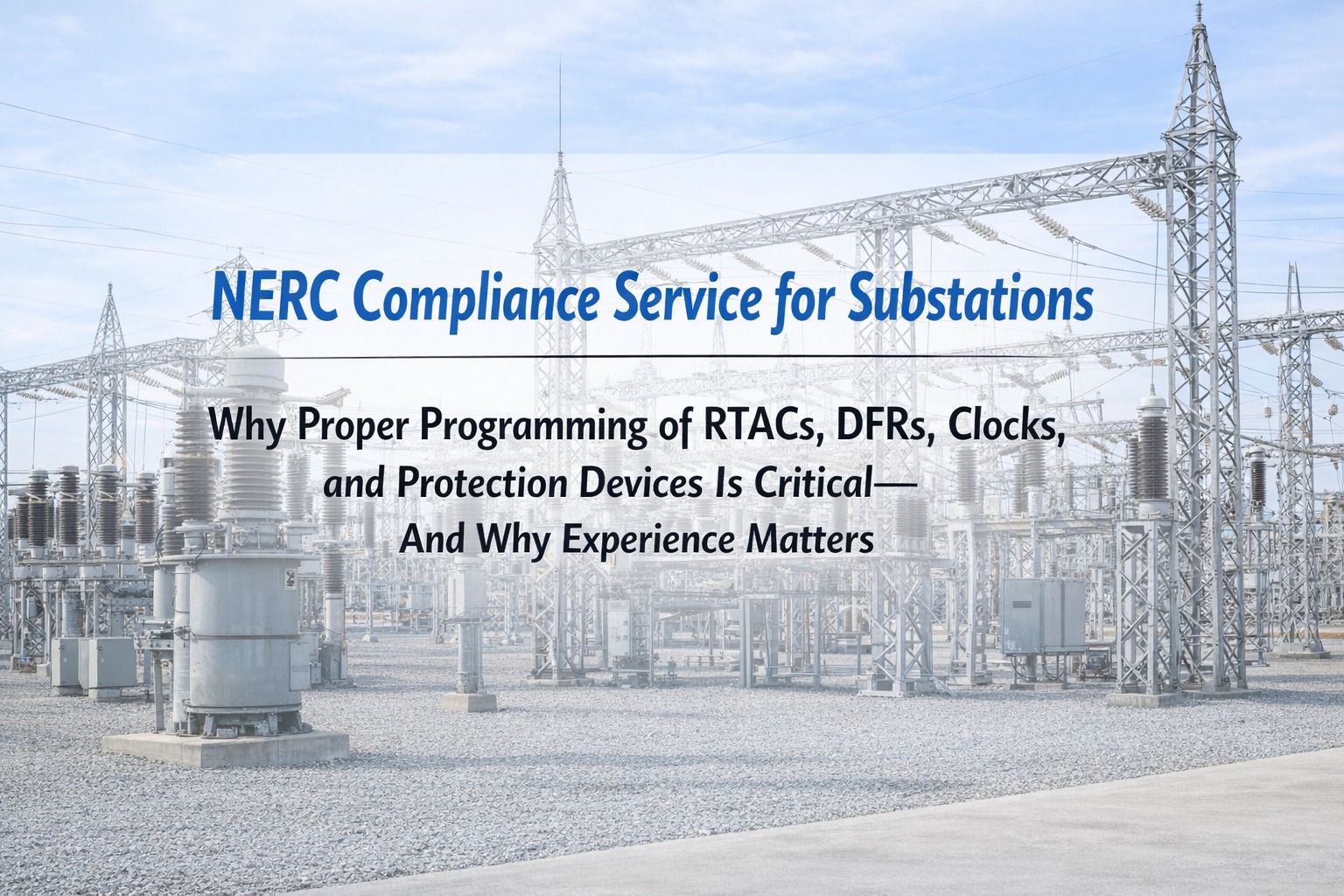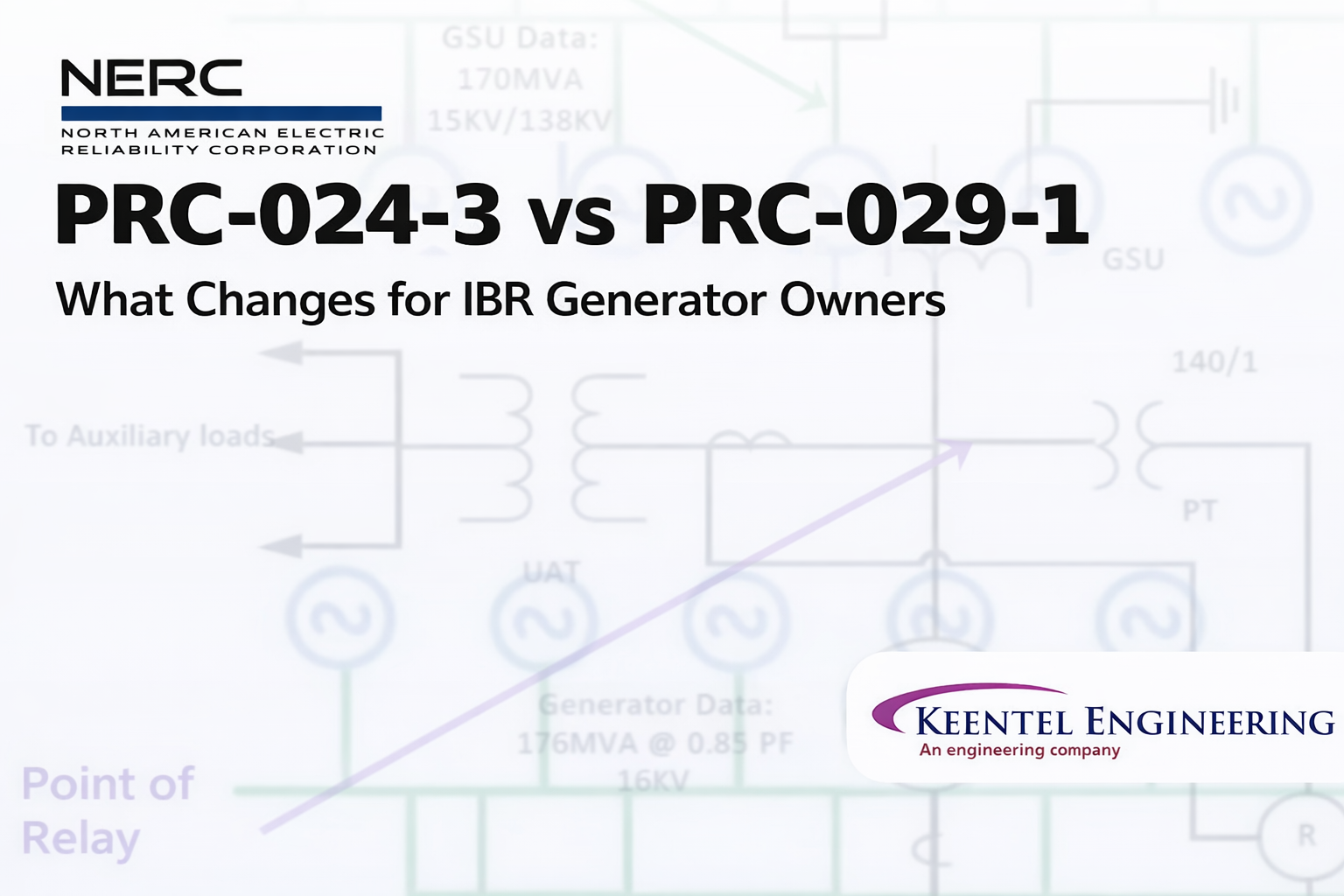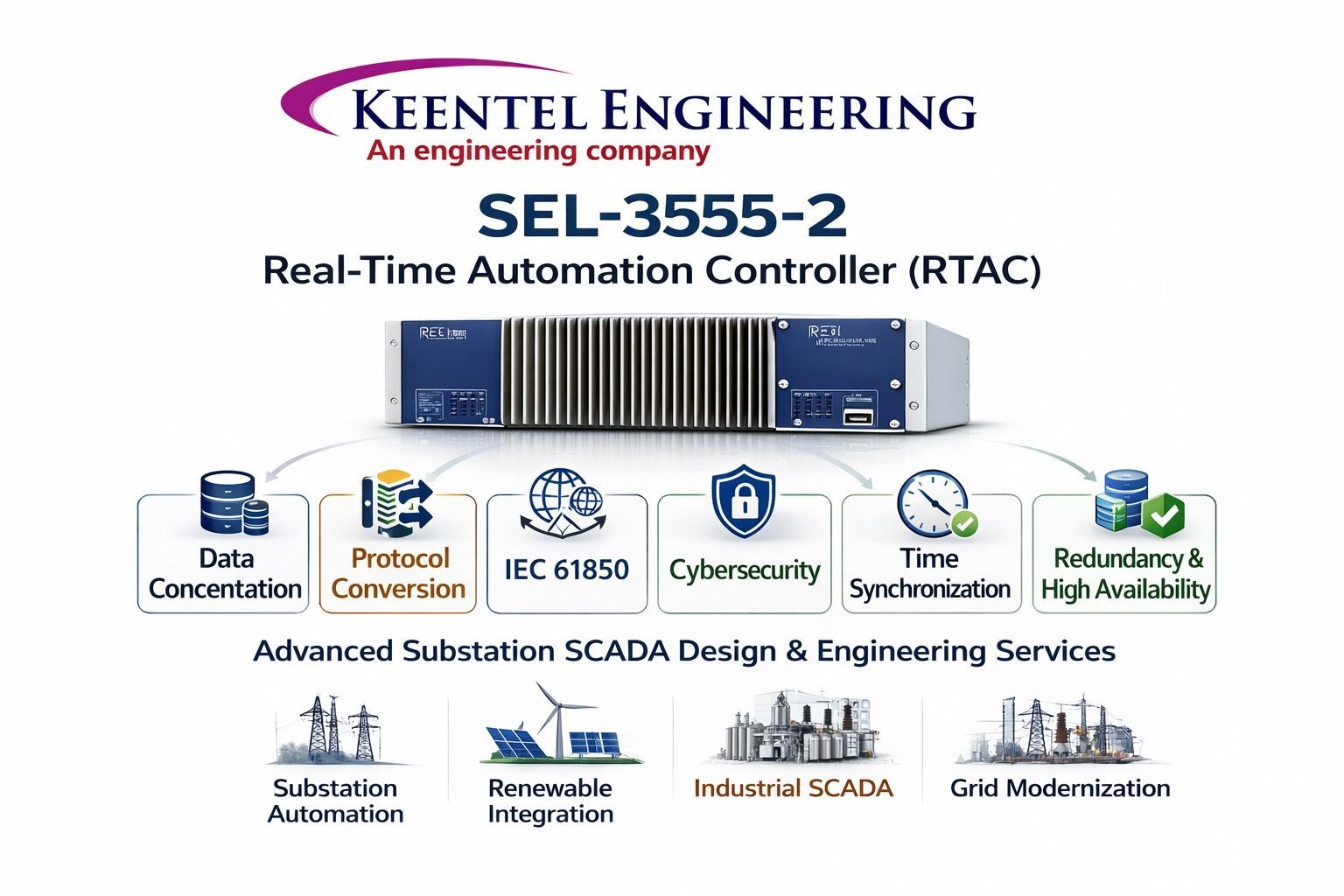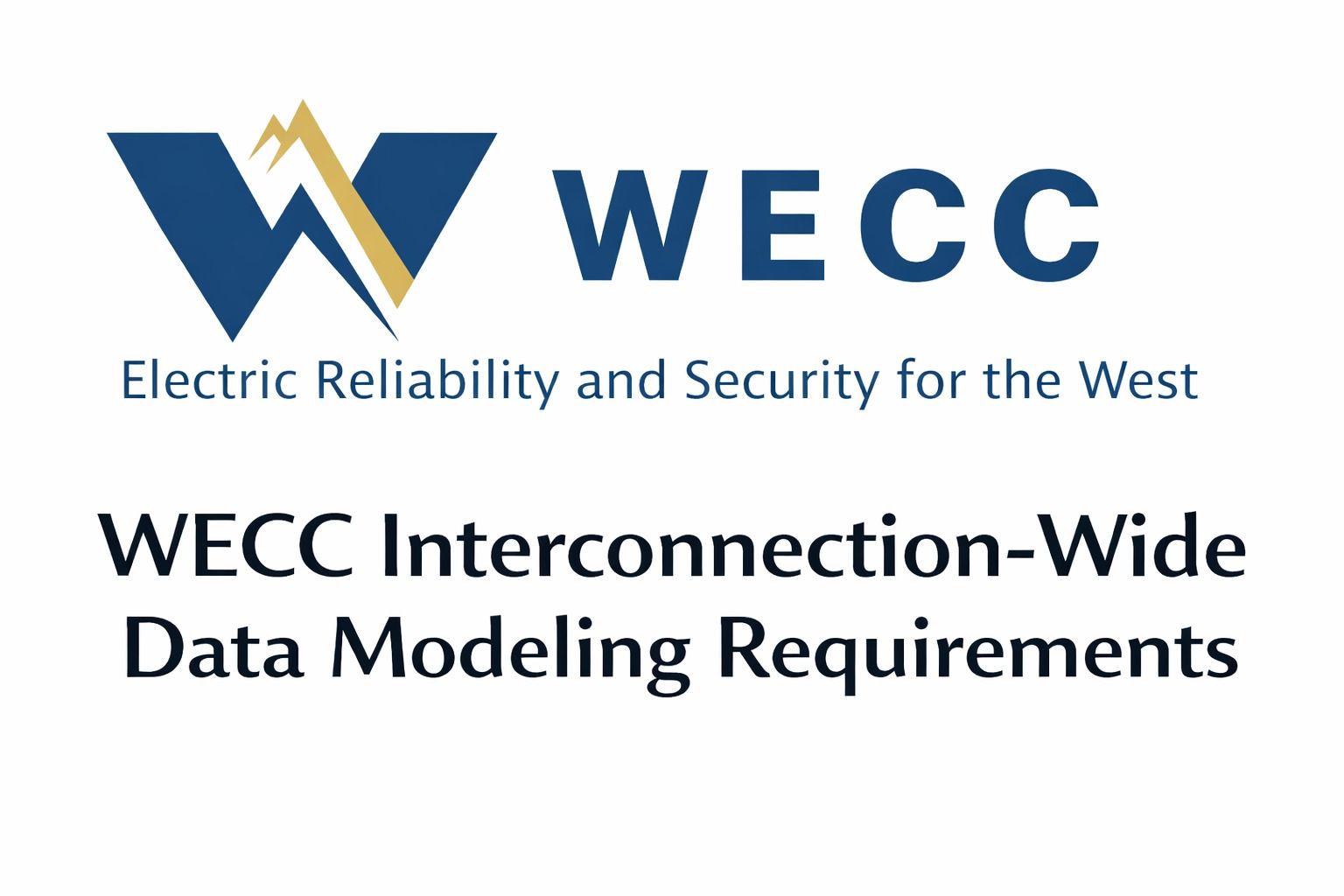A Coordinated Electric System Interconnection Review—the utility’s deep-dive on technical and cost impacts of your project.
Challenge: Frequent false tripping using conventional electromechanical relays
Solution: SEL-487E integration with multi-terminal differential protection and dynamic inrush restraint
Result: 90% reduction in false trips, saving over $250,000 in downtime
How PSCAD™ Empowers Advanced Electrical System Modeling at Keentel Engineering
April 25, 2025 | Blog
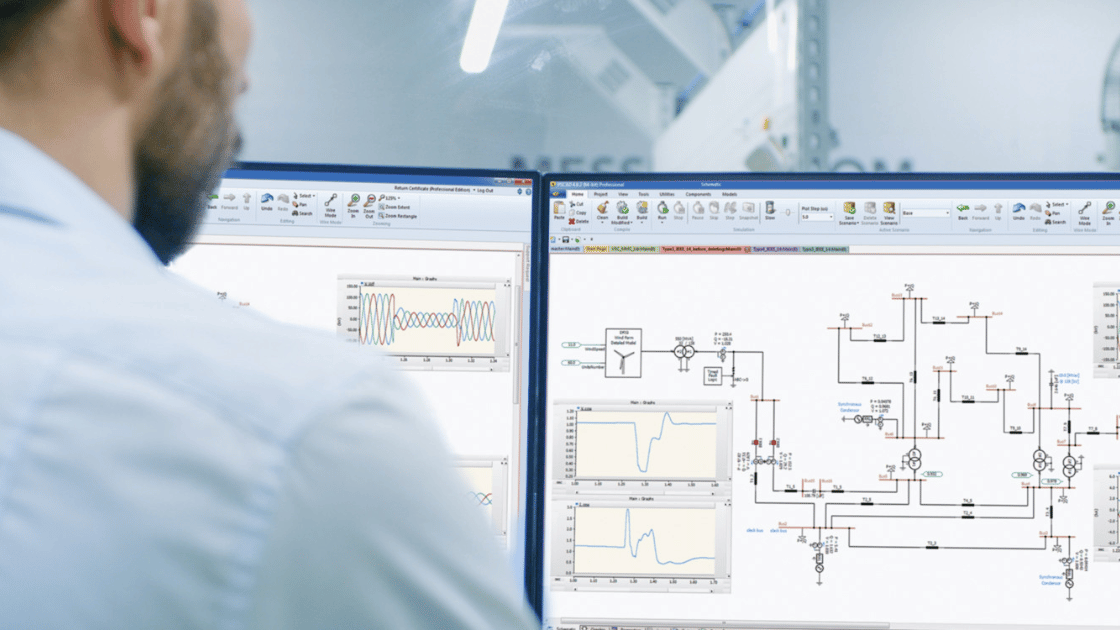
Keentel Engineering leverages cutting-edge simulation tools to deliver innovative solutions in power system analysis, high-voltage (HV) substation design, and renewable integration. One of our most powerful modeling tools is PSCAD (Power Systems Computer Aided Design), a graphical user interface tightly integrated with the EMTDC™ simulation engine for solving complex electromagnetic transient phenomena.
Whether we’re modeling a utility-scale solar integration, battery storage, or substation control schemes, PSCAD ensures precision, reliability, and regulatory compliance.
Successful projects begin with experienced electrical engineers. Our team provides
electrical substation design services for utilities, renewable developers, and EPC contractors requiring reliable, compliant infrastructure.
What Is PSCAD and EMTDC?
PSCAD™ (Power Systems Computer Aided Design), developed by the Manitoba HVDC Research Centre, is a time-domain simulation software seamlessly integrated with EMTDC™, a numerical solver designed for electromagnetic transient analysis. PSCAD allows engineers to:
- Graphically design and simulate entire electrical systems
- Model nonlinear, time-varying, or switched components
- Analyze protection systems, grid disturbances, and control dynamics
- Visualize voltage, current, harmonics, and stability parameters in real-time
EMTDC™ enables precise transient modeling of:
- HVDC systems, FACTS devices, synchronous machines
- Discrete and continuous-time controls
- Protection relay coordination and fault response
- Battery energy storage systems (BESS) and inverter-based resources (IBRs)
How Keentel Engineering Applies PSCAD Across Projects
1. Substation and Power System Design
We model entire substation layouts in PSCAD to simulate:
- Transformer energization and core saturation
- Grounding system design aligned with grounding study best practices
- Bus configurations, fault detection, breaker sequencing
- AC/DC switching, circuit breaker dynamics, and surge arrester operation
This empowers our substation engineering services with accuracy and speed.
2. Protection and Control Studies
Using PSCAD’s time-domain capabilities, we validate:
- Relay settings under dynamic fault conditions
- CT and PT saturation impacts
- Zone protection overlap
- Digital relay interfaces with control systems
This complements our circuit breaker commissioning expertise, ensuring robust protection schemes.
3. Renewable Energy Integration
For wind, solar, and BESS facilities, PSCAD supports:
- Low/high voltage ride-through performance
- Fast frequency response (FFR) and grid-forming inverter modeling
- Harmonic studies for inverter output per IEEE 519 standards
- Evaluation of grid-following vs. grid-forming behavior for renewable plants
We help developers meet CAISO, PJM, and ERCOT interconnection requirements confidently.
Unique Modeling Capabilities That Set PSCAD Apart
Graphical Schematic Design:
Intuitive drag-and-drop modeling, modular component reuse, and hierarchical organization.
Custom Component Creation:
Dynamic models built using Fortran, runtime panels, and internal control logic.
Frequency-Dependent Line Modeling:
High-fidelity transmission line modeling with accurate mutual coupling, earth return effects, and loss characterization.
Multiple Simulation Modes:
- Simulation Sets: Batch runs across conditions
- Electric Network Interface (ENI): Linking large systems
- Multiple Instance Modules (MIM): Scalable feeder and system designs
Real-Time Control and Visualization Features
During simulation runs, PSCAD offers:
- RMS voltage tracking across buses
- Dynamic controller tuning via runtime sliders
- On-the-fly fault testing and harmonic assessment
- Detailed plotting of waveform and phasor outputs
These features allow us to fine-tune control strategies for stable and resilient operations.
Advanced Tools and Customizations Keentel Leverages in PSCAD
| Tool | Functionality |
|---|---|
| Oscilloscope Meters | Capture and visualize time-domain responses |
| Blackboxing | Share protected model components with clients |
| Component Wizard | Build complex custom devices easily |
| Unit System Management | Maintain model consistency across projects |
| Debugging Tools | Quickly identify and resolve model inconsistencies |
Why Keentel Trusts PSCAD for Sensitive Simulations
Keentel Engineering supports critical projects requiring:
- Lightning impulse studies for insulation design
- Generator-grid dynamic interaction modeling
- Sub-synchronous resonance (SSR) assessments
- Control system modeling for HVDC and STATCOM installations
By using PSCAD, we can simulate these complex behaviors with fidelity, ensuring our designs meet the highest standards in safety, reliability, and compliance.
Industries That Benefit from Our PSCAD Expertise
- Utilities: Contingency planning, switching, transformer energization
- Renewables: Interconnection studies, harmonic compliance, ride-through validation
- Defense & Marine: Pulsed load studies, electromagnetic compatibility analysis
- Industrial Facilities: Converter modeling, motor starting, process optimization
Why Choose Keentel Engineering for PSCAD Modeling?
- 30+ years of proven engineering leadership
- Licensed Professional Engineers across multiple states
- Experts in NERC PRC-024, PRC-027, MOD-025, IEEE Std 2800 compliance
- Deep experience integrating PSCAD with MATLAB/Simulink, PSS®E, and PowerFactory
- Trusted by utilities, developers, EPCs, and ISO/RTOs nationwide
FAQs: PSCAD Modeling with Keentel Engineering
1. What types of studies can Keentel perform using PSCAD?
We conduct electromagnetic transient (EMT) studies including fault simulations, protection coordination, inrush current, switching transients, harmonic analysis, and grid compliance testing.
2. How accurate is PSCAD for modeling transmission lines?
Very accurate. We use PSCAD’s Frequency Dependent Phase Model via the Line Constants Program (LCP), incorporating DC correction, passivity checks, and mutual coupling.
3. Can Keentel simulate inverter-based resources (IBRs) like PV or BESS?
Yes, PSCAD is ideal for IBR modeling. We simulate grid-following and grid-forming inverter controls, LVRT/HVRT events, and test reactive power capability per IEEE 2800 and NERC PRC-024.
4. Does PSCAD support relay logic and protection system testing?
Absolutely. We use native models and custom-built logic to simulate relays, breakers, fault detectors, and logic coordination for protection testing.
5. How does PSCAD differ from other power system tools like PSSE or DigSILENT?
PSCAD focuses on time-domain electromagnetic transients, whereas tools like PSSE or DigSILENT are primarily for steady-state or RMS dynamic studies.
6. Can Keentel model surge arresters and insulation coordination?
Yes, PSCAD supports lightning impulse simulation, surge arresters, and dielectric withstand studies for proper insulation coordination design.
7. Do you support blackboxing for client confidentiality?
Yes, our blackboxing feature converts control-based modules into compiled, secure components, ensuring IP protection when sharing models with clients or utilities.
8. Can PSCAD be used for harmonic studies?
Yes. We simulate switching harmonics, resonance, filter design, and distortion levels from IBRs and nonlinear loads.
9. How does Keentel use PSCAD for high-voltage substation design?
We simulate transformer energization, cable charging, TRV (Transient Recovery Voltage), and grounding behavior, ensuring safe and reliable substation operation.
10. Do you use PSCAD for PRC compliance studies?
Yes. We use PSCAD for studies supporting PRC-024 (frequency/voltage ride-through), PRC-019 (protection coordination), and PRC-005 (battery and DC system validation).
11. How are EMTDC and PSCAD connected?
PSCAD is the interface; EMTDC is the simulation engine. PSCAD models feed into EMTDC, which solves differential equations for time-domain simulations.
12. Can PSCAD simulate simultaneous events or multiple subsystems?
Yes, using the Electric Network Interface (ENI), we simulate multiple subsystems running in parallel—ideal for campus microgrids, large substations, or zonal feeders.
13. Does PSCAD support scripting or automation?
Yes, we automate component behavior using Fortran scripting, parameter substitution, conditional logic, and control templates.
14. Can PSCAD interface with MATLAB or Simulink?
Yes, PSCAD offers bidirectional interfacing with MATLAB/Simulink for advanced control development or testing of hardware-in-the-loop algorithms.
15. How can I request a PSCAD-based study from Keentel Engineering?
Call us at 813-389-7871 or visit www.keentelengineering.com to submit your project scope. We offer fast turnaround, competitive pricing, and expert-level modeling
Start Your PSCAD™ Simulation Journey with Keentel Today
Precision matters. Compliance matters. Stability matters.
Contact Keentel Engineering to discover how our PSCAD-based solutions can elevate your project’s success.

About the Author:
Sonny Patel P.E. EC
IEEE Senior Member
In 1995, Sandip (Sonny) R. Patel earned his Electrical Engineering degree from the University of Illinois, specializing in Electrical Engineering . But degrees don’t build legacies—action does. For three decades, he’s been shaping the future of engineering, not just as a licensed Professional Engineer across multiple states (Florida, California, New York, West Virginia, and Minnesota), but as a doer. A builder. A leader. Not just an engineer. A Licensed Electrical Contractor in Florida with an Unlimited EC license. Not just an executive. The founder and CEO of KEENTEL LLC—where expertise meets execution. Three decades. Multiple states. Endless impact.
Services

Let's Discuss Your Project
Let's book a call to discuss your electrical engineering project that we can help you with.

About the Author:
Sonny Patel P.E. EC
IEEE Senior Member
In 1995, Sandip (Sonny) R. Patel earned his Electrical Engineering degree from the University of Illinois, specializing in Electrical Engineering . But degrees don’t build legacies—action does. For three decades, he’s been shaping the future of engineering, not just as a licensed Professional Engineer across multiple states (Florida, California, New York, West Virginia, and Minnesota), but as a doer. A builder. A leader. Not just an engineer. A Licensed Electrical Contractor in Florida with an Unlimited EC license. Not just an executive. The founder and CEO of KEENTEL LLC—where expertise meets execution. Three decades. Multiple states. Endless impact.
Leave a Comment
We will get back to you as soon as possible.
Please try again later.
Related Posts



